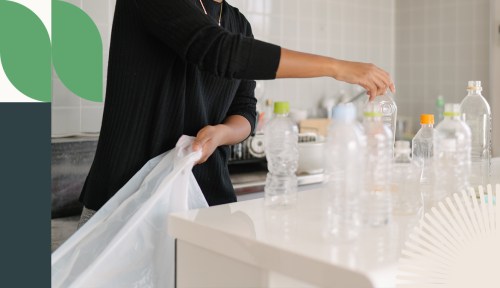Our editors independently select these products. Making a purchase through our links may earn Well+Good a commission
The Easiest Way To Figure Out Where To Start When Going Plastic-Free Costs $0
Looking to reduce plastic use? Zero-waste activist Lauren Singer shares the simplest (and cheapest!) way to cut plastic waste from your life.

I want to do my part to save the environment, but I often feel overwhelmed when tasked with understanding what’s required of me to live sustainably. After all, problematic materials, like plastic, are everywhere. Luckily Lauren Singer, a zero-waste activist and founder of Package Free Shop, has a simple trick that can help you reduce plastic use if you, like me, feel confused about where to even start.
Experts in This Article
Lauren Singer is a zero-waste activist and founder of Package Free and Trash is for Tossers.
And to be sure, the commitment to reducing plastic use is an important one for so many reasons. “The oil and gas industries, which create plastic, [are among] the most polluting industries and hugely expedite climate change,” Singer tells me. “Plastics…take up huge amounts of space in landfills, which are one of the largest contributors of methane emissions, and methane is more potent of a warming gas than carbon dioxide over a 100 year time frame.” All all of that is not good, to say the least.
In terms of our physiological environments, plastic is also not great. “It contains chemicals that are dangerous to human health,” says Singer. “[Plastics can] leach toxic chemicals, especially when we use them in applications that are hot and acidic, so like coffee, or putting plastic in the microwave.” While certain types of plastics hold more risk for potential harm than others in various applications (like when heated, for instance), experts say it’s unlikely you’ll be able to totally eliminate the risk of exposing yourself to toxic chemicals in plastic materials you use.
So, if we can’t eliminate risk completely, we must work to limit usage. But given how pervasive plastic is, how can we effectively accomplish that? First, remember that there’s no one-size-fits-all solution for reducing waste. Singer points out that we all have different lifestyle habits and routines, and different budgets that we’re comfortable dedicating to sustainable efforts, including the goal to reduce plastic use.
“A good place to start is by looking in your garbage can and seeing what you’re throwing away.” —Lauren Singer, zero-waste activist
The great news is that she has a zero-cost tip for getting started: “A good place to start is by looking in your garbage can and seeing what you’re throwing away,” she says. “Because you can see if there’s anything [in the garbage] that you can find a multi-use alternative for, or that you can just live without [buying again], because we might be buying things just for the sake of buying them or because habit has taught us to do these things.”
Two great examples where you can cut corners? Welp, Q-tips can be easily substituted (Package Free Shop sells a Reusable Ear Swab set for $12). And a menstrual cup, like the Cora Cup ($39), is another sustainable investment, and one that’ll save you money on the long run.
This hack also doesn’t have to be limited to plastics only, either. When checking out your trash, consider other items you routinely buy that cause waste, like paper towels. It’s a classic recurring expense on your wallet and the planet’s health that you can easily sub. “People buy them regularly, because it’s a part of American consumer culture,” says Singer. “But if you realize like, ‘Oh, I’m not super-attached to paper towels, I really don’t know why I use them—is there a more sustainable reusable alternative?’ you could buy a reusable towel, and then just wash it.”
She stresses that “not being attached” is sort of the key here, because making sustainable choices is highly personalized, and everyone has different needs and preferences. Knowing this, you don’t have to necessarily delete anything from your lifestyle that gives you extreme joy. Think more in the vein of habits you don’t really need, spot it, make note of it, and find an eco-friendly switch. The fish, your body, and the planet itself will thank you.
Oh hi! You look like someone who loves free workouts, discounts for cult-fave wellness brands, and exclusive Well+Good content. Sign up for Well+, our online community of wellness insiders, and unlock your rewards instantly.
Sign Up for Our Daily Newsletter
Get all the latest in wellness, trends, food, fitness, beauty, and more delivered right to your inbox.
Got it, you've been added to our email list.








